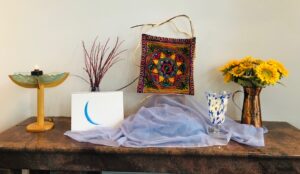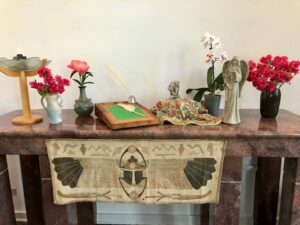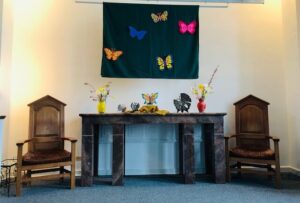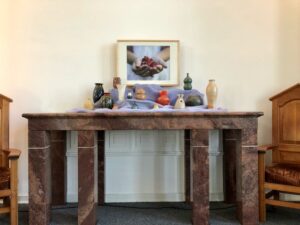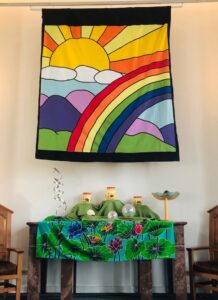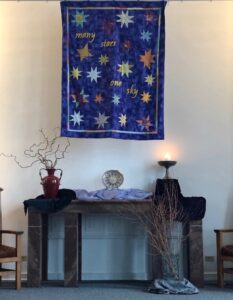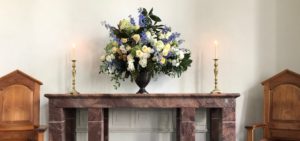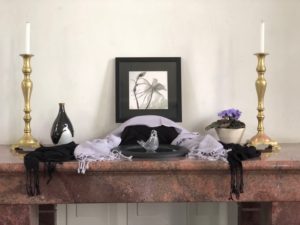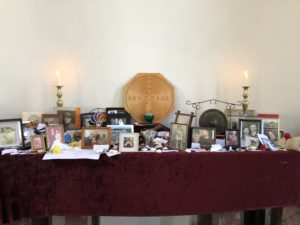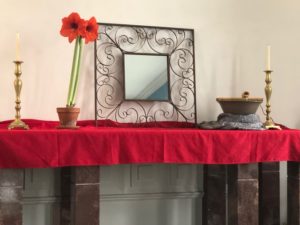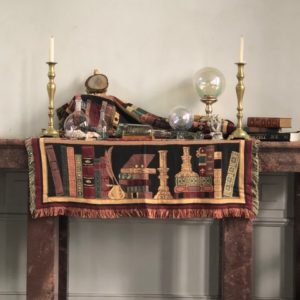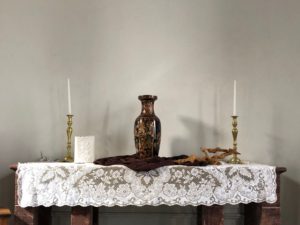Theology for a Pandemic. https://youtu.be/HIjDj4jhd5w
This is the sermon video that Rev. Alex made for us for April 26, to be included in the zoom worship live, and to be here for anyone to see after the service. There is also a text available below.
Sermon for April 26, 2020 for TJMC UU
“Theology for a Pandemic”
by Rev. Alex McGee, MDiv., BCC, serving as Assistant Minister
Good morning everyone…I wish so much we could be together in person so see, hear, feel each other. But, we are in this electronic mode, and this is the sermon video that I have made for April 26 that will be used during the zoom service and posted on line for anyone anywhere anytime to see.
LAMENT
I will begin this sermon with a lament.
I begin this sermon naming the aches, pains, heartaches, sorrows, fears.
Let us allow ourselves to acknowledge the hurting places.
Those whose homes do not feel safe and cannot get enough food.
Those who struggle to care for their children and their elders safely.
The longing of a child to have playmates.
We hear the loss of those who had hoped to be in a graduation ceremony, hoped to watch the birth, hoped to share in the rites of passage.
We hear the lament of longing to hug, to hold, to touch, to whisper in an ear.
We know the emptiness of loneliness – how vast? How deep?.
We hear the lament of wondering when sickness and death will come, wondering if we will be ready.
We acknowledge the burden of guilt of wondering if one may have infected another—whether this guilt makes sense or not.
We grieve that those who are grieving cannot gather together.
There is a strain of blame when another passes too closely, feels too careless.
We hear the anger of those who work hard and wish others would stay home.
We hear the anger of those who fear for their livelihood and families by staying home.
The longing of those who wish to work, to make a difference, to lend a hand, to be of use.
We fear because we know that fear can make a people weak to division and blame.
We hear the ancient cry of those who feel on the margins and wonder if they are included.
The anger that yet again, having less means that one has less when misfortune hits us all.
That trying to get ahead is harder for those who were already behind.
The ancient striving of those with resources to give enough to be generous in the ways that truly make us a whole society, not just parts of society.
Wondering when this will end? And what will the end look like?
Will there ever be a time of ease again? A time of comfort?
These are the laments, the sorrowful wails, the quiet anguish of humans throughout history when they have faced a plague.
ATHENS
Over 2000 years ago, in ancient Greece, in Athens there was a Great Plague, in 430 BC. A person named Thucydidides survived and recorded his observations.
“Thucydides and his contemporaries did not believe that we are born good. We become good by choosing to do good. We become brave by choosing courage. We overcome the twin vices of self-interest and fear by actively rejecting them”.
That’s a quote from Katherine Kelaidis, a scholar of ancient Greece.(article in Atlantic Magazine, March 23 2020)
She tells us that he saw in the plague the way people behaved:
“For the violence of the calamity was such that men, not knowing where to turn, grew reckless of all law, human and divine.” And “Men who had hitherto concealed what they took pleasure in, now grew bolder.”
Now for those of you with a humanist worldview, who rely on the notion that humans can do what is good, your theory is sorely tested and well proven at this moment. The basic tenants of ethics is that they go to the individual needs to be balanced with the good of the whole group. We see that being done and not done in extremes right now. Individualism shows up when people make decision about changing jobs, changing homes, picking schools, options for food solely on their own preferences. Now that individualism and its cost comes to the forefront.
HUMAN GOOD
Those of you who believe in the inherent goodness of all people may be wondering whether this is actually true. Leaders who allow social breakdown, people who flout the safety of others, people who blame and discriminate—do they actually have inherent goodness?
Didn’t we all agree that the good of the whole is greater than the good of the individual? Or perhaps not? Our social contracts are being strained now. Those who could always see the cracks are not surprised.
What would it mean right now to take the attitude toward each person we meet: I need you to survive?
I encourage those of you who are feeling a bit guilty that you have the privilege to be safe not to spend your energy on guilt. Let us all focus on what it means that we are interconnected and one person’s well-being or depends on another. When one is safe, all are more safe.
We are called to live out our spirituality in the very way we use the word “we.”
GOD
And what of those who believe in a God?
Those of you who believe in a God may be asking: God, why would you allow this to happen?
God are you still there?
This is an age old question by those who feel abandoned and at great risk, with no where to turn.
In times like this, many find that their prayer lives feel scattered, although they trust that God is close, even if they can’t turn their attention to God’s comfort.
Perhaps those who believe in God can accept a God who does not control everything, a God who cannot re-write the actions of others.
Perhaps the theists among us can find comfort in a God who comes alongside for the journey through the darkness; who nudges us toward kindness, even when we feel frozen by fear.
This is not a God who ends disease, but gives wisdom and comfort to those who face the disease.
There is a saying that has been attributed to many people over the centuries from ancient Greece to modern Germany: it says:
beckoned or unbeckoned
God is present.
This is true in human relationships also.
We can show caring without knowing how to fix something.
We can tell a person we will listen even if we have no answers.
We can shower love on a person and that can be enough to help them through the ache that has no end in sight.
WHAT LEGACY WILL WE LEAVE FOR OUR CHILDREN?
The way a society comes out of tragedy sets the tone for what lies ahead.
The United Nations began after WWII because people were horrified by what happened when we were divided, and sought to maintain togetherness.
When I was a very small child, my father would tell me that if you want to get a group of people to hate another group of people, you tell them that they’re different. He said that’s what Hitler did. When I have this memory, part of the image is that I think I remember my mother saying to my father that I was too young to learn about Hitler.
Now, looking back, I see a few things about that. I probably was too young to grasp it and make sense of it, but I was old enough to put it somewhere in my memory bank and draw on it later in adult years.
Also, I’ve come to see that using Hitler as the sole example of hatefulness does not serve us well. There are many examples of atrocities around the world and they happen on a spectrum. We need to pay attention to all of them, including our own.
So I beseech you now, I encourage you: talk to the children you know about what the world dynamics are.
Tell them that what’s happening now is not normal.
Give them a new Hope.
I’ve been hearing so many of you say that your grandparents whose children are now working from home and so you help out your own children by having video chat time with your grandchildren regularly.
Ive been hearing from others who are a bit overwhelmed with your own kids at home instead of in school.
Use this time well.
I believe you have the power to plant the seeds of idealism and justice in the minds of the next generation.
Think of what they will need to know decades from now, when the next social tragedy occurs.
Teach them to be strong in the most opened heart way
Show them strong hands but open hands
Cultivate alert minds but relaxed minds
May we all have an upright backbone housing a warm heart.
Blessed be,
Amen

